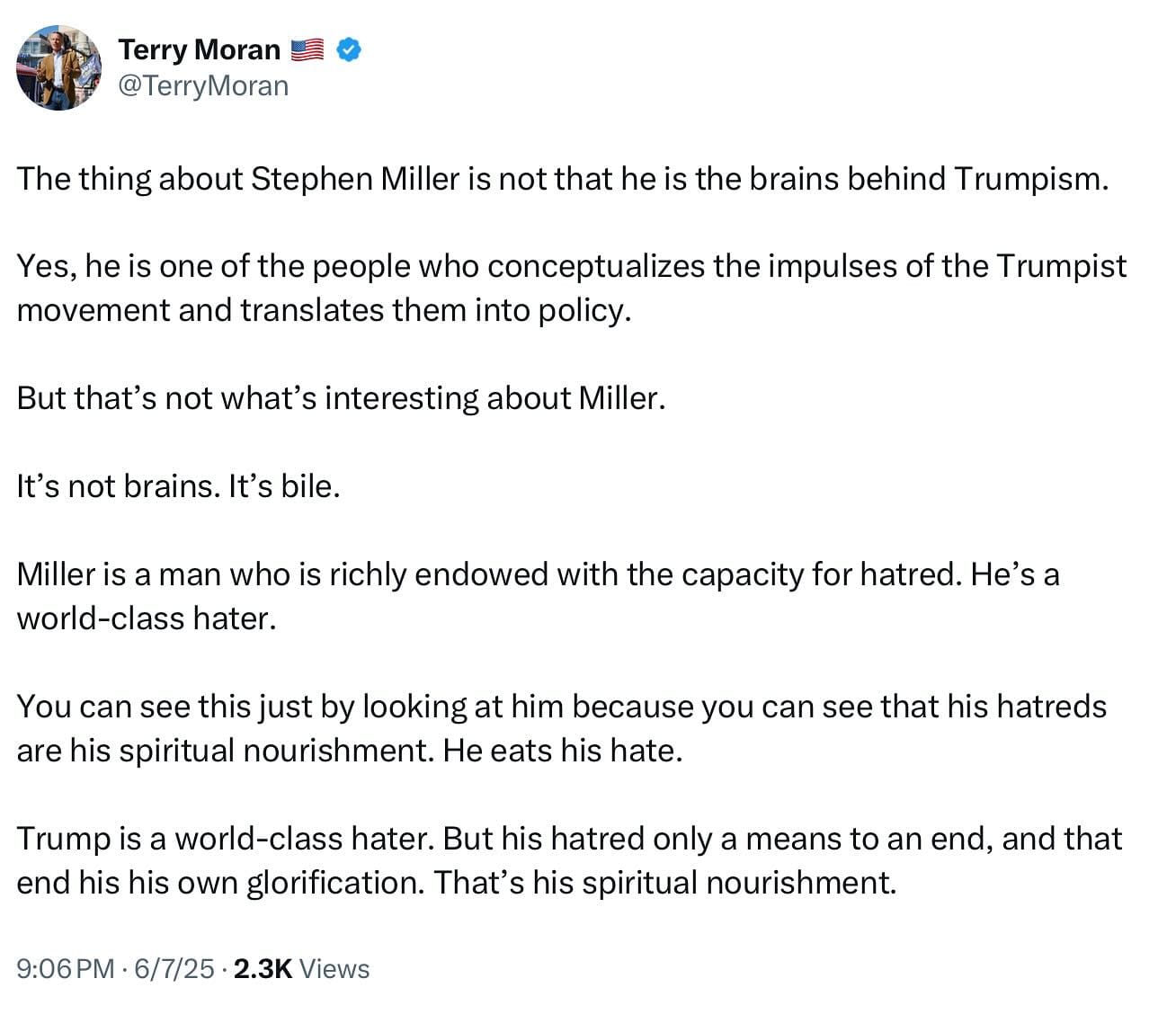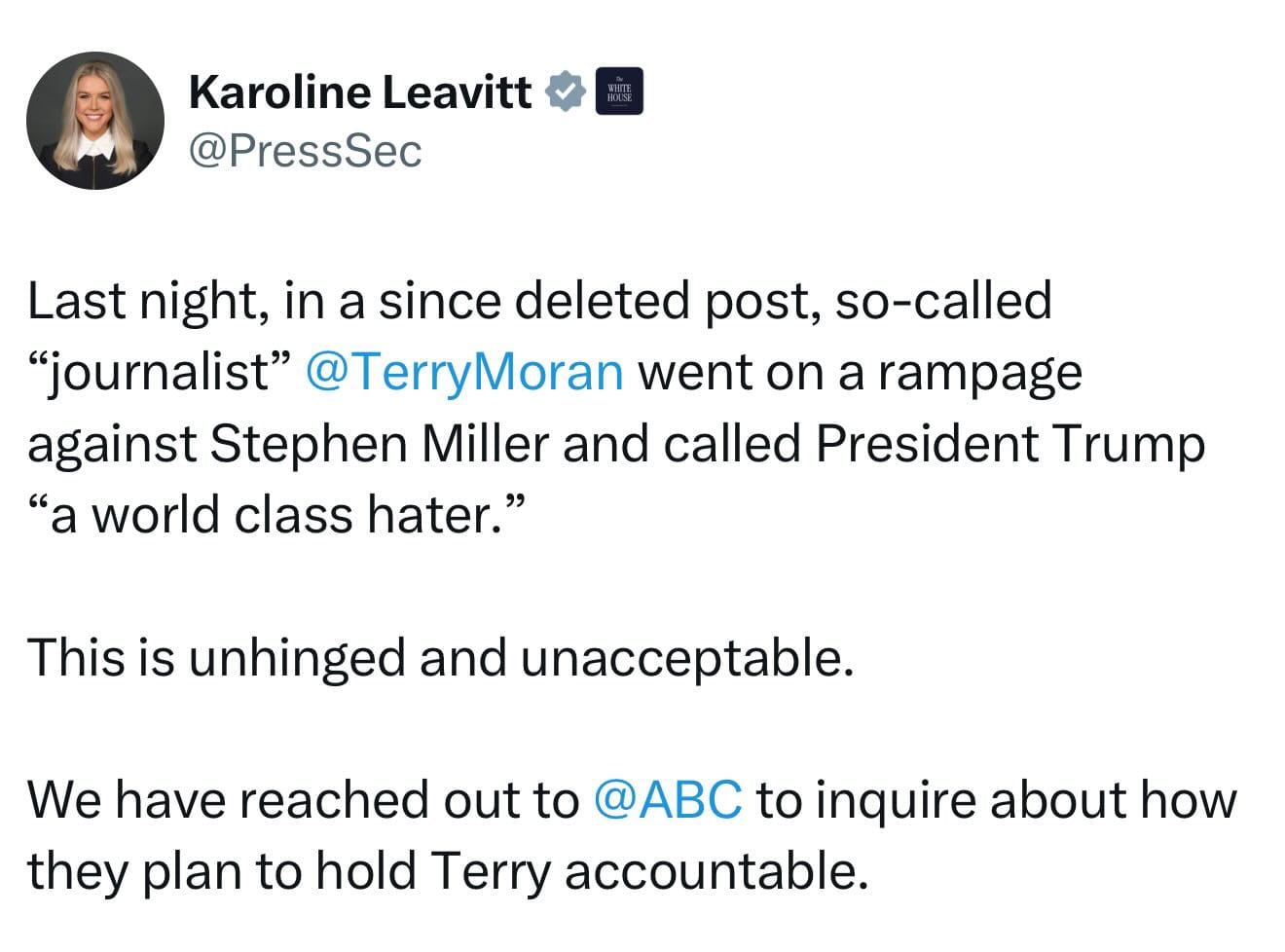It’s not offensive to call Stephen Miller hateful. It’s offensive to pretend he’s not.
In 2015, Donald Trump began an assault on political norms that would culminate in a presidency defined by cruelty, chaos, and contempt. He encouraged violence against protestors at his rallies. He led crowds in chants to imprison his political opponents. He publicly humiliated his own staff and advisors, belittling them on Twitter before firing them on live television. He referred to immigrants as “animals,” described countries like Haiti and El Salvador as “shitholes,” and told four Congresswomen of color to “go back” to the countries they came from.
He refused to condemn white supremacists after Charlottesville, telling the nation there were “very fine people on both sides.” He attacked a Gold Star family. He suggested injecting bleach as a treatment for COVID-19. He called fallen soldiers “suckers” and “losers.” He described journalists as “the enemy of the people” and joked about extending his presidency beyond two terms. The decision to mock a disabled reporter at a rally was not incidental; it was the thesis statement.
Rejection of decency was the point.
Since that moment, the debate over how Trump and his allies should be treated has taken on a surreal quality. Should they be debated? Shamed? Platformed? Deplatformed? Should we show them the respect afforded to traditional political actors, or are they playing a different game entirely? And if they are, why are we still pretending they aren’t?
Which brings me to the hypocritical firestorm surrounding ABC journalist Terry Moran, who wrote on social media that Trump aide Stephen Miller is not just the brains behind Trumpism, but its bile. Moran called Miller "a world-class hater," a man for whom cruelty is not just a tactic, but a kind of sacrament.

The post, later deleted, triggered an avalanche of condemnation from the right. Karoline Leavitt of the Trump campaign labeled it "unhinged." Senator JD Vance called it a "vile smear." Katie Miller, Stephen Miller’s wife and former Pence spokeswoman, called for Moran’s firing.



None of them could substantively the content of Moran’s criticism.
Their objection was moral, not factual. They were scandalized that the veil of civility had been pierced.
The Weaponization of Norms
In democratic discourse, civility facilitates cooperation and mutual respect. But in asymmetrical political conflicts, civility can be weaponized. A political movement that disregards norms can manipulate its opponents into upholding them unilaterally. The result is a kind of rhetorical disarmament, where one side plays by Queensberry rules and the other brings brass knuckles.
This has been the Trump movement's core innovation. By relentlessly violating standards of truthfulness, decency, and decorum, Trumpism has created a kind of discursive asymmetry. Critics who respond in kind are branded hysterical, uncivil, or deranged. Those who respond too gently are complicit. The sweet spot is vanishingly small, and deliberately so.
Stephen Miller embodies this ethos. As the architect of family separation at the border, a defender of slashing refugee admissions, and an advocate for some of the most draconian immigration policies in recent American history, Miller has positioned himself as the movement's ideologue of cruelty. He is not an outlier. He is the point.
The problem isn't that Moran went too far. The problem is that this kind of honesty is considered more scandalous than the policies it describes.
When the Offense Is Telling the Truth
Trump’s opponents have long struggled with how to respond to a political movement that thrives on offense. The traditional repertoire of political critique - fact-checks, appeals to decency, bipartisan condemnation - has proven ridiculously, almost laughably inadequate. Trump understands that in media ecosystems driven by spectacle, outrage functions as fuel. He doesn’t mind being called a liar or a bigot, so long as his opponents are stuck reacting to him.
But Trump and his allies do draw lines - just not around bigotry or brutality. Their boundaries are drawn around disrespect toward them. What offends them most is not misrepresentation. It is irreverence. To call Stephen Miller a "world-class hater" is to say out loud what many believe, what the facts support, but few in institutional media are willing to state plainly. That is the real offense.
Journalists and pundits have spent the last decade trapped in a false symmetry: the idea that fairness requires treating both sides of the political spectrum as equally flawed, equally extreme, equally deserving of respect. But this doctrine has always rested on a foundational lie: that the two parties are behaving in comparable ways.
They are not. The Republican Party has embraced authoritarian rhetoric, conspiracy theories, and open disdain for democratic norms. The Democratic Party, for all its flaws, has not. This is not a matter of opinion. It is a matter of record.
But when a journalist like Moran refuses to pretend that Stephen Miller is just another political adviser - when he punctures the illusion of symmetry - he becomes the story. Not the policies. Not the human suffering. The breach of tone.
Historical Parallels: Decency in the Face of Indecency
History offers grim warnings about the costs of prioritizing civility over clarity. In the early 1930s, German centrists and conservatives assured themselves that Hitler could be tamed by the institutions of government. They were wrong. In the 1950s, Senator Joseph McCarthy rose to power by saying the unsayable - and it took a breaking of the civility spell by journalist Edward R. Murrow to begin his downfall.
Murrow’s famous critique was not diplomatic. It was devastating. "We must not confuse dissent with disloyalty," he said. "We will not walk in fear, one of another." That kind of moral clarity is now rare, and when it appears, it is punished.
Terry Moran’s tweet was met with official inquiries from the Trump campaign to ABC News, demands for termination, and widespread right-wing media backlash. No such pressure campaign emerged when Stephen Miller implemented policies that left children in cages. No coordinated moral outcry when Trump encouraged violence at rallies, bragged about sexual assault, or attempted to overturn an election.
We have arrived at a moment where the description of cruelty is more controversial than the cruelty itself.
This is not a neutral imbalance. It is a structural one. And it is being exploited.
The Case for Asymmetrical Response
Critics of Trumpism are often told that they must not sink to his level. That to preserve democracy, one must always act with decorum and grace. But what if that grace is being used against you? What if the very idea of "norms" is being hollowed out by people who recognize them only as tools of manipulation?
To say that Trump has forfeited the right to normative respect is not to say that anyone should be cruel for cruelty's sake. It is to say that the moral clarity required in moments of crisis cannot always wear a tie. Sometimes it has to shout. Sometimes it has to name names.
Terry Moran did what many in the press have not dared to do. He told the truth, in plain language, about the nature of the ideology he has covered for decades. The backlash to that truth is a symptom of the sickness he described.
The Trump movement is not playing by the rules. It mocks decency, exploits deference, and wields outrage as a branding strategy. To insist on treating it like a traditional political phenomenon is a category error. And to scold those who recognize that error and act accordingly is to uphold a fragile illusion at the expense of reality.
If we are to take the threat seriously, we have to stop pretending its architects are entitled to the benefit of doubt, the presumption of good faith, or the bone china and teacups of polite disagreement. They have chosen another path. Our refusal to name it only makes it easier to walk.
Civility has its place. But clarity must come first. When clarity sounds harsh, that's not always a sign of excess. Sometimes it is the sound of finally telling the truth. And when Terry Moran described Stephen Miller as a man nourished by hatred, it was not an ad hominem attack. It was a diagnosis.
The Index is a reader-supported, indie publication.
Now, more than ever, the world needs an independent press that is unencumbered by commercial conflicts and undue influence.
By taking out an optional founding membership, you can help us build a free, accessible, independent news platform firewalled from corporate interests.



